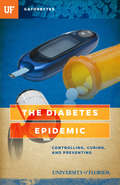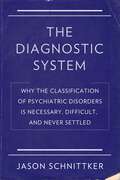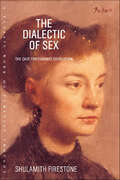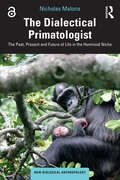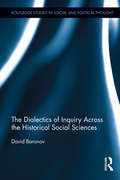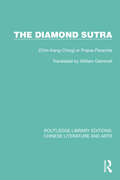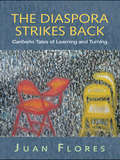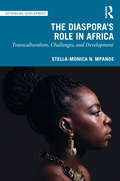- Table View
- List View
The Devil's Wheels: Men and Motorcycling in the Weimar Republic (Explorations in Mobility #2)
by Sasha DiskoDuring the high days of modernization fever, among the many disorienting changes Germans experienced in the Weimar Republic was an unprecedented mingling of consumption and identity: increasingly, what one bought signaled who one was. Exemplary of this volatile dynamic was the era's burgeoning motorcycle culture. With automobiles largely a luxury of the upper classes, motorcycles complexly symbolized masculinity and freedom, embodying a widespread desire to embrace progress as well as profound anxieties over the course of social transformation. Through its richly textured account of the motorcycle as both icon and commodity, The Devil's Wheels teases out the intricacies of gender and class in the Weimar years.
The Devil: Britain's Most Feared Underworld Taxman
by Graham JohnsonDrug dealers beware. The Devil is coming to get you. Gangster Stephen French invented the perfect crime: robbing drug barons of their huge fortunes. In SAS-style swoops, French raided their fortified mansions and tortured them with horrifying violence until they paid up. Through 'taxing' the richest and most powerful crimelords in the UK, he netted over £20 million.French was no ordinary criminal. He was a world-champion fighter, he studied psychology at university to master mind-control techniques, and he used the teachings of Machiavelli and samurai warriors to outwit his enemies. The Devil also reveals French's complex relationship with Curtis Warren, the wealthiest criminal in British history. The two were childhood pals, then partners and finally bitter enemies.Now a legitimate businessman, French built up a multimillion-pound empire. Having eventually turned his back on his former life, he is now seeking to set the record straight.
The Devil’s Music: How Christians Inspired, Condemned, and Embraced Rock ’n’ Roll
by Randall J. StephensWhen rock ’n’ roll emerged in the 1950s, ministers denounced it from their pulpits and Sunday school teachers warned of the music’s demonic origins. The big beat, said Billy Graham, was “ever working in the world for evil.” Yet by the early 2000s Christian rock had become a billion-dollar industry. The Devil’s Music tells the story of this transformation. Rock’s origins lie in part with the energetic Southern Pentecostal churches where Elvis, Little Richard, James Brown, and other pioneers of the genre worshipped as children. Randall J. Stephens shows that the music, styles, and ideas of tongue-speaking churches powerfully influenced these early performers. As rock ’n’ roll’s popularity grew, white preachers tried to distance their flock from this “blasphemous jungle music,” with little success. By the 1960s, Christian leaders feared the Beatles really were more popular than Jesus, as John Lennon claimed. Stephens argues that in the early days of rock ’n’ roll, faith served as a vehicle for whites’ racial fears. A decade later, evangelical Christians were at odds with the counterculture and the antiwar movement. By associating the music of blacks and hippies with godlessness, believers used their faith to justify racism and conservative politics. But in a reversal of strategy in the early 1970s, the same evangelicals embraced Christian rock as a way to express Jesus’s message within their own religious community and project it into a secular world. In Stephens’s compelling narrative, the result was a powerful fusion of conservatism and popular culture whose effects are still felt today.
The Dhammapada and Sutta-Nipata
by F. Max MullerThis is a subset of F. Max Mullers great collection The Sacred Books of the East which includes translations of all the most important works of the seven non-Christian religions which have exercised a profound influence on the civilizations of the continent of Asia. The works have been translated by leading authorities in their field.
The Diabetes Epidemic: Controlling, Curing, and Prevention
by University of Florida Leonora LaPeter AntonThe University of Florida has an ambitious goal: to harness the power of its faculty, staff, students, and alumni to solve some of society’s most pressing problems and to become a resource for the state of Florida, the nation, and the world. The Diabetes Epidemic explores the complicated landscape of diabetes research and offers a glimpse of the extraordinarily difficult, and sometimes serendipitous, ways in which breakthroughs occur. At the University of Florida Diabetes Institute more than 100 faculty members are working on education, research, prevention, and treatment. Their fields are diverse—genetics, endocrinology, epidemiology, patient and physician education, health outcomes and policy, behavioral science, and rural medicine—but their goal is the same. Jump into the trenches with the doctors, scientists, and research nurses at the Diabetes Institute to learn about the challenges associated with developing treatments. Meet a brother who is helping his sister by participating in one of the largest studies ever undertaken of people at risk for Type 1 diabetes. Visit the largest open-access repository of diabetic pancreases in the world, where the most studied is that of a 12-year-old boy who had Type 1 diabetes for only a year. Spend time with one of the foremost diabetes researchers as he decides which pancreases to study, deploys experimental projects to answer new questions, and struggles to fund additional investigations. Discover why Type 2 diabetes is affecting more and more people and how some of them control it, and learn about a few of the most promising Type 2 treatments currently under study. While a cure has not yet been found, the researchers at UF’s Diabetes Institute are working to improve the lives of the estimated 415 million people currently suffering from the disease worldwide. The stories chronicled in GATORBYTES span all colleges and units across the UF campus. They detail the far-reaching impact of UF’s research, technologies, and innovations—and the UF faculty members dedicated to them. Gatorbytes describe how UF is continuing to build on its strengths and extend the reach of its efforts so that it can help even more people in even more places.
The Diagnostic System: Why the Classification of Psychiatric Disorders Is Necessary, Difficult, and Never Settled
by Jason SchnittkerMental illness is many things at once: It is a natural phenomenon that is also shaped by society and culture. It is biological but also behavioral and social. Mental illness is a problem of both the brain and the mind, and this ambiguity presents a challenge for those who seek to accurately classify psychiatric disorders. The leading resource we have for doing so is the American Psychiatric Association’s Diagnostic and Statistical Manual, but no edition of the manual has provided a decisive solution, and all have created controversy. In The Diagnostic System, the sociologist Jason Schnittker looks at the multiple actors involved in crafting the DSM and the many interests that the manual hopes to serve. Is the DSM the best tool for defining mental illness? Can we insure against a misleading approach?Schnittker shows that the classification of psychiatric disorders is best understood within the context of a system that involves diverse parties with differing interests. The public wants a better understanding of personal suffering. Mental-health professionals seek reliable and treatable diagnostic categories. Scientists want definitions that correspond as closely as possible to nature. And all parties seek definitive insight into what they regard as the right target. Yet even the best classification system cannot satisfy all of these interests simultaneously. Progress toward an ideal is difficult, and revisions to diagnostic criteria often serve the interests of one group at the expense of another. Schnittker urges us to become comfortable with the socially constructed nature of categorization and accept that a perfect taxonomy of mental-health disorders will remain elusive. Decision making based on evolving though fluid understandings is not a weakness but an adaptive strength of the mental-health profession, even if it is not a solid foundation for scientific discovery or a reassuring framework for patients.
The Dialectic Is in the Sea: The Black Radical Thought of Beatriz Nascimento
by Beatriz NascimentoCollected writings by one of the most influential Black Brazilian intellectuals of the twentieth centuryBeatriz Nascimento (1942–1995) was a poet, historian, artist, and political leader in Brazil&’s Black movement, an innovative and creative thinker whose work offers a radical reimagining of gender, space, politics, and spirituality around the Atlantic and across the Black diaspora. Her powerful voice still resonates today, reflecting a deep commitment to political organizing, revisionist historiography, and the lived experience of Black women. The Dialectic Is in the Sea is the first English-language collection of writings by this vitally important figure in the global tradition of Black radical thought.The Dialectic Is in the Sea traces the development of Nascimento&’s thought across the decades of her activism and writing, covering topics such as the Black woman, race and Brazilian society, Black freedom, and Black aesthetics and spirituality. Incisive introductory and analytical essays provide key insights into the political and historical context of Nascimento&’s work. This engaging collection includes an essay by Bethânia Gomes, Nascimento&’s only daughter, who shares illuminating and uniquely personal insights into her mother&’s life and career.
The Dialectic Of Sex: The Case For Feminist Revolution
by Shulamith FirestoneA best-seller upon its original publication in 1970--when Shulamith Firestone was just twenty-five years old--The Dialectic of Sex was the first book of the women's liberation movement to put forth a feminist theory of politics. Beginning with a look at the radical grassroots history of the first wave of feminism and its foundation in the abolition movement, Firestone documents its major victory, the granting of the vote to women in 1920, and the fifty-year backlash that followed. Deftly synthesizing the work of Freud, Marx, de Beauvoir, and Engels, Firestone creates a powerful argument for feminist revolution in which she asserts that women must seize the means of reproduction. For as long as women (and only women) are required to bear and rear children, they will lack the biological and attendant economic independence required to be completely liberated. Ultimately, she presents feminism as the key radical ideology, the missing link between Marx and Freud, uniting their visions of the political and the personal. As revelatory and urgent as it was upon its first publication, The Dialectic of Sex is a testament to Shulamith Firestone's startlingly prescient vision. It remains required reading for anyone concerned about the history of feminism as well as the ongoing hurdles faced by women to this day in regard to motherhood, child care, and career.
The Dialectic of Sex: The Case for Feminist Revolution
by Shulamith Firestone“No one can understand how feminism has evolved without reading this radical, inflammatory second-wave landmark.” —Naomi WolfOriginally published in 1970, when Shulamith Firestone was just twenty-five years old, and going on to become a bestseller, The Dialectic of Sex was the first book of the women's liberation movement to put forth a feminist theory of politics.Beginning with a look at the radical and grassroots history of the first wave (with its foundation in the abolition movement of the time), Firestone documents its major victory, the granting of the vote to women in 1920, and the fifty years of ridicule that followed. She goes on to deftly synthesize the work of Freud, Marx, de Beauvoir, and Engels to create a cogent argument for feminist revolution. Identifying women as a caste, she declares that they must seize the means of reproduction—for as long as women (and only women) are required to bear and rear children, they will be singled out as inferior. Ultimately she presents feminism as the key radical ideology, the missing link between Marx and Freud, uniting their visions of the political and the personal.In the wake of recent headlines bemoaning women's squandered fertility and the ongoing debate over the appropriate role of genetics in the future of humanity, The Dialectic of Sex is revealed as remarkably relevant to today's society—a testament to Shulamith Firestone's startlingly prescient vision. Firestone died in 2012, but her ideas live on through this extraordinary book.“A must-have for those interested in feminist theory, both past and present.” ―Kathleen Hanna, founding member of the Riot Grrrls movement
The Dialectical Primatologist: The Past, Present and Future of Life in the Hominoid Niche (New Biological Anthropology)
by Nicholas MaloneThe Dialectical Primatologist identifies the essential parameters vital for the continued coexistence of hominoids (apes and humans), synthesising primate research and conservation in order to develop culturally compelling conservation strategies required for the facilitation of hominoid coexistence. As unsustainable human activities threaten many primate species with extinction, effective conservation strategies for endangered primates will depend upon our understanding of behavioural response to human-modified habitats. This is especially true for the apes, who are arguably our most powerful connection to the natural world. Recognising the inseparability of the natural and the social, the dialectical approach in this book highlights the heterogeneity and complexity of ecological relationships. Malone stresses that ape conservation requires a synthesis of nature and culture that recognises their inseparability in ecological relationships that are both biophysically and socially formed, and seeks to identify the pathways that lead to either hominoid coexistence or, alternatively, extinction. This book will be of keen interest to academics in biological anthropology, primatology, environmental anthropology, conservation and human–animal studies.
The Dialectics of Friendship (Routledge Revivals)
by Roy Porter; Sylvana TomaselliFirst published in 1989, The Dialectics of Friendship explores the ideals and paradoxes of friendship against the backdrop of other relationships. The book begins with an introduction to the subject of friendship in its historical and cultural setting. Following chapters explore the ideal of friendship in classical Greece, and the richness and ambiguities of friendship in the Christian tradition. The social dimensions of friendship are discussed, including among children, between men, between women, and between humans and animals, and the wider historical and political aspects of friendship are examined. The Dialectics of Friendship will appeal to those with an interest in the sociology, psychology, and history of friendship, as well as psychoanalysis, literary criticism, and classics.
The Dialectics of Inquiry Across the Historical Social Sciences: Dialectics Of Inquiry Across The Historical Social Sciences (Routledge Studies in Social and Political Thought #85)
by David BaronovThis book turns conventional global-historical analysis on its head, demonstrating, first, that local events cannot be derived — logically or historically — from large-scale, global-historical structures and processes and, second, that it is these structures and processes that, in fact, emerge from our analysis of local events. This is made evident via an analysis of three disparate events: the New York City Draft Riots, AIDS in Mozambique, and a 2007 flood in central Uruguay. In each case, Baronov chronicles how expressions of human agency at the level of those caught up in each event give form and substance to various abstract global-historical concepts — such as slavery in the Americas, global capitalist production, and colonial/postcolonial Africa. Underlying this repositioning of the local and the ephemeral is an immanent, phenomenological analysis that illustrates how mere transient events are the progenitors of otherwise abstract, global-historical concepts. Traversing the intersections of human agency and structural determinism, Baronov deftly retains the nuance and serendipity of everyday life, while deploying this nuance and serendipity to further embellish our understanding of those enduring global-historical structures and processes that shape large-scale, long-term, historical accounts of social and cultural change across the historical social sciences.
The Dialectics of Urban and Architectural Boundaries in the Middle East and the Mediterranean (The Urban Book Series)
by Suzan Girginkaya Akdağ Mine Dinçer Meltem Vatan Ümran Topçu İrem Maro KırışThis edited volume informs readers about changing norms and meanings of borders and underlines recent scenarios that shape these borders. It focuses mainly on the Mediterranean and Middle East regions through the following questions: What are the social, cultural, philosophical, political, economic and aesthetic reasons for spatial segregation within contemporary territories and cities? In the world of globalization and networks, what are the new limitations of space? What are the alienating differences between interior and exterior, private and public, urban and rural, local and global, and real and virtual? Are spatial definitions and divisions more likely to be weakened (if not totally erased) by effects of globalization and mobility, similar to the dissolution of borders between countries? Or are local practices and measures likely to become more apparent with emerging trends such as sustainability and identity? Authored by international scholars, all chapters are arranged under four main parts: Urban and Rural, Global and Local, Physical and Sensual, Real and Virtual. Hence, different concepts and definitions of borders along with varying methods and tools for questioning their essence in architectural and urban spaces will be introduced. For example, in the rural and urban context, environments, settlements-housing, landscape, transformation, conservation and development; in the global and local context, styles, identity, universal design, sustainability, globalization and networks, mobility and migration; in the physical and sensual context, design studies and methodologies, environmental psychology, aesthetic reasoning, sense of place and well-being, and in the real and virtual context, realities, tools and communities are the main themes of the chapters.This book will be an essential source for professionals, scholars, and students of architecture and urban design with a view to understanding multidisciplinary perspectives in designing borders as well as the dialectical relationship between borders and space.
The Diamond Sutra: (Chin-Kang-Ching) or Prajna-Paramita (Routledge Library Editions: Chinese Literature and Arts #12)
by William GemmellThis book, first published in 1912, is an English translation of The Diamond Sutra from the Chinese text of Kumarajiva, one of the most metaphysical of the works ascribed to Buddha. With parallel passages and numerous annotations, this is a classic translation of the one of the most important texts in Chinese Buddhism.
The Diaries Of Charles Greville
by Edward PearceCharles Greville (1794-1865) made his first occasional diary entries in 1814, but the diary only became a regular habit in the mid-1820s, continuing with occasional breaks, about which he is self-reproachful, through the reigns of George IV, William IV and Victoria. Finally, in 1860, after shaking his head over the worrying triumphs of Garibaldi, he closed it, once and for all. The grandson of a duke, Greville looked with a level and scornful eye upon royalty. George was 'the most worthless dog that ever lived'; William 'the silliest old gentleman in his own dominions, but what can be expected of a man with a head like a pineapple?' The diaries roused Queen Victoria - 'an odd woman' - from the lethargy of her widowhood.She spoke of Greville's 'indiscretion, indelicacy, ingratitude toward friends, betrayal of confidence and shameful disloyalty'.Greville's circle included Talleyrand, Wellington, Macaulay, Sydney Smith, Princess Lieven, Lord Grey, Melbourne, Guizot and Disraeli, as well as 'jockeys, bookmakers and blackguards'.As Clerk of the Privy Council, Greville works for a compromise on the Reform Bill.He witnesses Covent Garden theatre burning down.His closest friend, Lord De Ros, is caught cardsharping. Visiting Balmoral, he finds Albert and Victoria living 'not merely like small gentlefolks, but like very small gentlefolks'. When cholera comes, he writes laconically of 'Mrs Smith, young and beautiful, taken ill while dressing for Church and dead by nightfall.' Not a chatterbox, Charles Greville brilliantly assembles everyone else's chatter. This is the intelligent voice of another age, an uneasy aristocrat catching history on the turn and looking dubiously at the future.
The Diaries of Elizabeth Inchbald Vol 2
by Ben P RobertsonAn energetic woman, Inchbald achieved fame as an actress, novelist, playwright and critic. This work includes her eleven surviving diaries, which record Inchbald's social contacts and professional activities, itemize her day-to-day expenditure, and chart the development of affairs such as the Napoleonic Wars and the trial of Queen Caroline.
The Diary of Dawid Sierakowiak: Five Notebooks From the Lodz Ghetto
by Dawid Sierakowiak"In the evening I had to prepare food and cook supper, which exhausted me totally. In politics there's absolutely nothing new. Again, out of impatience I feel myself beginning to fall into melancholy. There is really no way out of this for us. " This is Dawid Sierakowiak's final diary entry. Soon after writing it, the young author died of tuberculosis, exhaustion, and starvation--the Holocaust syndrome known as "ghetto disease. " After the liberation of the Lodz Ghetto, his notebooks were found stacked on a cookstove, ready to be burned for heat. Young Sierakowiak was one of more than 60,000 Jews who perished in that notorious urban slave camp, a man-made hell which was the longest surviving concentration of Jews in Nazi Europe. The diary comprises a remarkable legacy left to humanity by its teenage author. It is one of the most fastidiously detailed accounts ever rendered of modern life in human bondage.
The Diary of Henry Teonge: Chaplain on Board H.M's Ships Assistance, Bristol and Royal Oak 1675-1679
by Henry TeongeFirst published in 1927. 'This diary is history' The ObserverThis is the first complete published edition of Teonge's Diary. The edition of 1825, besides omitting several passages, contained many faulty transcriptions which have now been corrected for this edition. An intensely human document, enlivened with sketches of the people he met and places he visited, Teonge's Diary is one of the finest accounts of life on board ship in the seventeenth century. When not at sea, Henry Teonge's life was as a parson and this edition of his Diary includes a full inventory for his Parish, providing an excellent source of historical and social information on rural life in the late 1600s.
The Diary of Mattie Spenser: A Novel
by Sandra DallasNo one is more surprised than Mattie Spenser herself when Luke Spenser, considered the great catch of their small Iowa town, asks her to marry him. Less than a month later, they are off in a covered wagon to build a home on the Colorado frontier. Mattie's only company is a slightly mysterious husband and her private journal, where she records the joys and frustrations not just of frontier life, but also of a new marriage to a handsome but distant stranger. As she and Luke make life together on the harsh and beautiful plains, Mattie learns some bitter truths about her husband and the girl he left behind and finds love where she least expects it. Dramatic and suspenseful, this is an unforgettable story of hardship, friendship and survival.
The Diary of Queen Maria Carolina of Naples, 1781-1785: New Evidence of Queenship at Court (Queenship and Power)
by Cinzia ReccaThis work offers a new portrayal of Queen Maria Carolina of Naples as a woman of power with weaknesses and ambitions, and analyzes the Queen's actions, from her political choices to her alliance and betrayals. A careful examination of the period (1781-1785) covered by the diary shows that the daily life of the Queen and offers key evidence of her political acumen and her personal relationships. Recca cross-analyses unpublished personal documents, which include the integral diary and private correspondence. The book focuses on the political influence that Queen Maria Carolina wielded beside her husband, King Ferdinand IV, and the criticism that has been made by contemporary historians and intellectuals who have often tended to discredit the sovereign for personal rather than political reasons.
The Diary of Samuel Golfard and the Holocaust in Galicia
by Wendy LowerThe Diary of Samuel Golfard and the Holocaust in Galicia examines the contents and context of a rare diary written by a Jewish man from Nazi-occupied Poland. Serving as both a record and an artifact of Samuel Golfard’s life, the diary details his attempt to make sense of and resist the event that ultimately destroyed him. Wendy Lower integrates photographs, newspaper articles, documents, and testimonies to create a more complete picture of Golfard’s experiences and writings. She also traces the diary’s own journey after Golfard’s death, from 1943 Poland to the present day.
The Diary of a Manchu Soldier in Seventeenth-Century China: "My Service in the Army", by Dzengseo (Routledge Studies in the Early History of Asia)
by Nicola Di CosmoProviding original insights into Chinese military history, Nicola Di Cosmo gives an annotated translation of the only known military diary in pre-modern Chinese history, providing fresh and extensive information on the inner workings of the Ch'ing army. The personal experience of the author, a young Manchu officer fighting in inhospitable South-Western China, take us close to the 'face of the battle' in seventeenth-century China, and enriches our general knowledge of military history.
The Diary of a Provincial Lady
by E. M. DelafieldThe Diary of a Provincial Lady is a witty celebration of the suburban British housewife. The Provincial Lady has a nice house, a nice husband, and nice children. She never raises her voice, rarely ventures outside Devon, only occasionally allows herself to become vexed by the ongoing servant problem, and would be truly appalled by the confessional mode that has gripped the late 20th century. The Provincial Lady, after all, is part of what made Britain great.
The Diaspora Strikes Back: Caribeño Tales of Learning and Turning (Cultural Spaces)
by Juan FloresIn The Diaspora Strikes Back the eminent ethnic and cultural studies scholar Juan Flores flips the process on its head: what happens to the home country when it is being constantly fed by emigrants returning from abroad? He looks at how 'Nuyoricans' (Puerto Rican New Yorkers) have transformed the home country, introducing hip hop and modern New York culture to the Caribbean island. While he focuses on New York and Mayaguez (in Puerto Rico), the model is broadly applicable. Indians introducing contemporary British culture to India; New York Dominicans bringing slices of New York culture back to the Dominican Republic; Mexicans bringing LA culture (from fast food to heavy metal) back to Guadalajara and Monterrey. This ongoing process is both massive and global, and Flores' novel account will command a significant audience across disciplines.
The Diaspora's Role in Africa: Transculturalism, Challenges, and Development (Rethinking Development)
by Stella-Monica N. MpandeAfricans living in the diaspora have a unique position as potential agents of change in helping to address Africa’s political and socioeconomic challenges. In addition to sending financial remittances, their multiple, hybrid identities in and out of geographical and psychocultural spaces allow them to play a role as cultural and political ambassadors to foster social change and sustainable development back in their African homelands. However, this hybrid position is not without challenges, and this book reflects some of the conundrums faced by members of the diaspora as they negotiate their relationships with their home countries. The author uses her lived experiences and empirical research to ask: are members of the diaspora conduits of Western cultural hegemony at the cost of their traditional preservation and meaningful development in Africa? How does the Western media’s portrayal of Africa as the "Dark Continent" in the 21st century influence their decision-making process to invest back home? How could African nations’ governments manage their relationships with citizens abroad to motivate them to invest in their home countries? How do some citizen-residents in Africa and African Diaspora communities perceive each other in the context of Africa’s development? How could the African Diaspora collaborate with citizen-residents across growth sectors to impact Africa’s development? The book hopes to inspire agents of change within the diaspora and features diverse African entrepreneurs’ success stories and their experiences of tackling these challenges. The book will be of interest to aspiring entrepreneurs, researchers across African studies, and the expanding and vibrant field of diaspora research.




